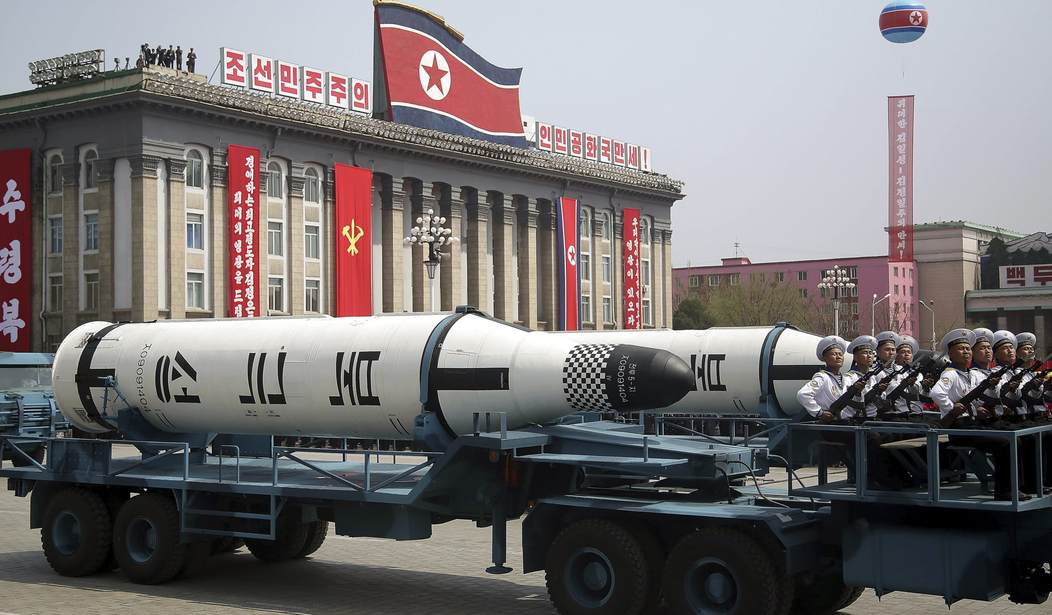Former Defense Secretary and CIA Director Leon Panetta said U.S. strategy on North Korea “has to be one of containment and deterrence,” and “we have to up that game, including our presence there.”
Ahead of a Friday UN Security Council meeting on North Korea, to be led by Secretary of State Rex Tillerson, Pyongyang said today that any war in the region is the fault of the United States. “In case a war breaks out on the peninsula, the U.S. will be held wholly accountable for causing trouble after bringing lots of strategic assets and special warfare means,” an unidentified ministry spokesman told the regime’s official Korean Central News Agency.
“The UNSC that has toed the U.S. line will never be able to evade its responsibility,” the spokesman added.
The U.S. has begun installing the Terminal High Altitude Area Defense (THAAD) system in a southeast region of South Korea, sparking heated protests from some local residents, Yonhap news agency reported.
Panetta stressed to MSNBC today that “there is a reason why most recent presidents have not pulled a trigger when it comes to North Korea — and it is because of the obvious consequences with regards to what they could do to Seoul, a city of 20 million to 25 million, and the fact that it could escalate into a nuclear war, which would take millions of lives as a result of that.”
In addition to supporting allies and increasing sanctions against North Korea, he said, “we have to keep pressure on China so that they are serious about putting pressure on North Korea.”
“In the past, they put a little pressure on but they then backed away. I think we have got to make sure that they continue to put pressure on North Korea to back off of the testing of ICBMs and nuclear weapons.”
That includes keeping sanctions against China “on the table for consideration because we have got to make very clear that North Korea, if they develop an ICBM with some kind of miniaturized nuclear weapon, that that represents a direct threat to the security of the United States.”
“And it is unacceptable,” he added.
President Trump told Fox News last week that China, which buys more than 80 percent of North Korea’s exports, was being especially helpful: “Nobody has ever seen such a positive response on our behalf from China,” he said.
At a press conference Thursday, Trump reiterated his “great respect” for Chinese President Xi Jinping, saying of the communist leader, “I liked him very much, I respect him very much.”
“And I think he’s working very hard. I can say that all of the pundits out there are saying they never have seen China work like they’re working right now,” he added. “…I actually told him, I said, ‘You’ll make a much better deal on trade if you get rid of this menace or do something about the menace of North Korea.’ Because that’s what it is, it’s a menace right now.”
Before an administration meeting with senators on Capitol Hill today, Senate Foreign Relations Committee Ranking Member Ben Cardin (D-Md.) emphasized “there’s no good military end to this situation,” so “you’ve got to use economic pressure.”
“So how is the United States using our leadership in the world to change the equations in North Korea so that we can get the inspectors on the ground, we can freeze their current program and ultimately prevent North Korea from being a nuclear power?” Cardin said. “…The only way this comes to a happy ending is if North Korea changes its course.”
Foreign Relations Committee member Cory Gardner (R-Colo.) told CNN on Tuesday that the U.S. “needs to show strength in coordination with our allies between South Korea, Japan, using that relationship to force China who has the most control over the North Korean regime of any nation around the globe using that relationship to force China to take action with one goal in mind: that’s the peaceful denuclearization of Kim Jong-un.”
The deployment of the THAAD system “is important and we need to show strength to South Korea,” Gardner said.
“But I do think soft power is extremely important in this instance. We haven’t utilized all of the tools at our disposal,” he added. “We haven’t exercised all of the sanctions we could impose on those agencies, businesses, entities involved with participating in business with North Korea’s illicit activities. They need to show the world how they are going to work for a plan with China to step up and do more.”








Join the conversation as a VIP Member